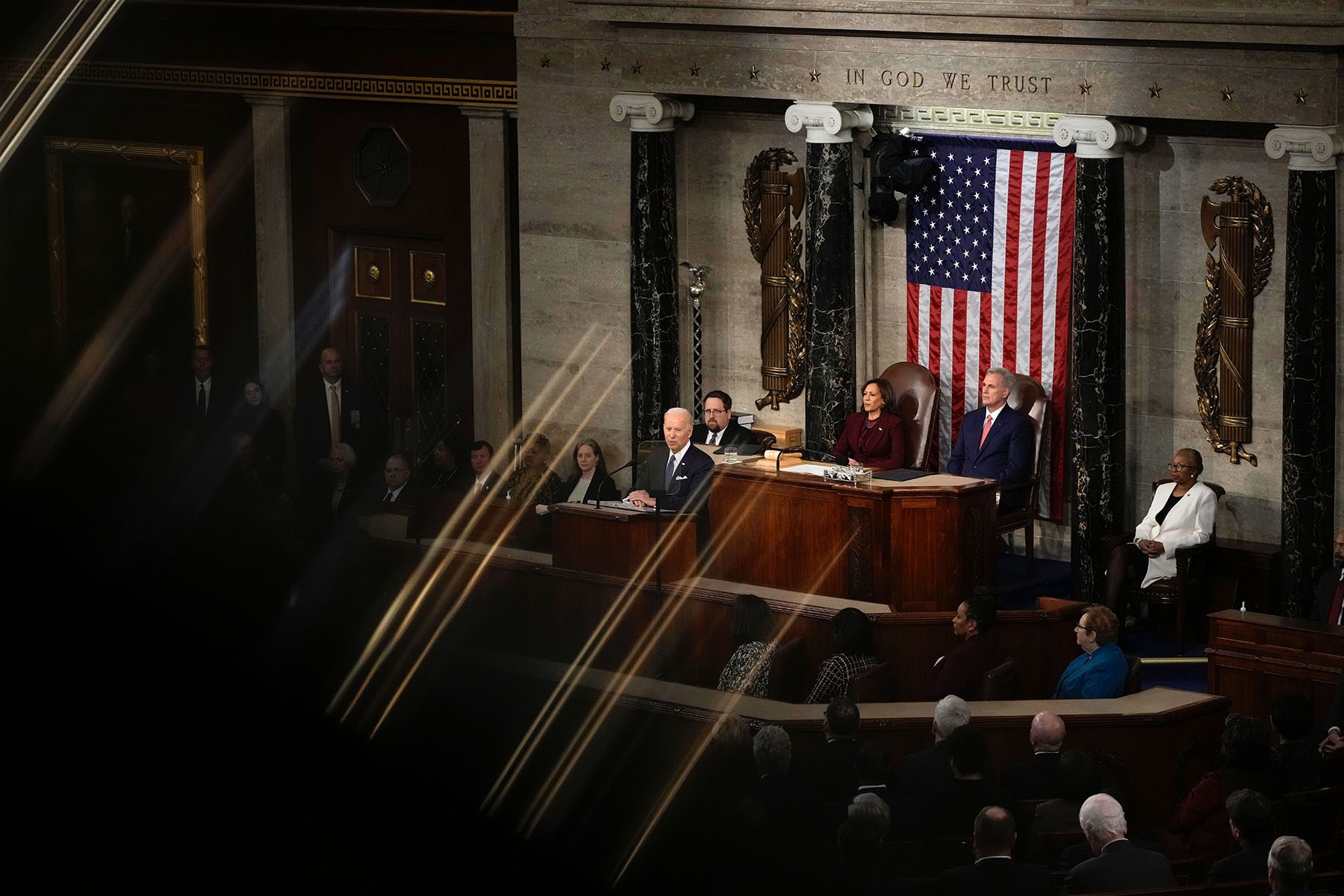We’re answering the “how” and “why” of politics news. Subscribe to our daily newsletter.
The presidential election season began in earnest this week as President Joe Biden delivered a State of the Union address that read like a preview of his anticipated reelection bid, and Republicans offered clues to their 2024 playbook.
Biden’s pitching himself as the person who wants to find common ground and fix problems that impact families. Republicans, meanwhile, want to cast him and Democrats as out of step with concerns about identity and culture.
Biden repeated his theme, “Finish the job,” 12 times in the 73-minute speech. Many of the White House guests seated with First Lady Jill Biden reinforced the administration’s priorities, including reproductive rights, the fight to cure cancer, infrastructure and police reform. Following the address, the president, Vice President Kamala Harris and other administration officials hit the road this week, reinforcing his message to voters and touting their list of accomplishments.
-
More from The 19th
- She didn’t want to be the face of the abortion fight. But she ended up as a guest at the State of the Union.
- Biden said 107 words on abortion and LGBTQ+ issues in the State of the Union. Here’s why that matters.
- ‘They need to see’: RowVaughn Wells on what it means to attend Biden’s State of the Union address
From Republicans, both the message and the messengers were gendered. Sarah Huckabee Sanders, the first woman elected governor of Arkansas and the youngest governor in the country at 40, delivered the GOP response to the State of the Union, casting Biden and Democrats as extreme on abortion, race and LGBTQ+ issues. And Nikki Haley — the former governor of South Carolina and U.S. ambassador to the United Nations who delivered the Republican response to President Barack Obama’s State of the Union address in 2016 — previewed her expected foray into the 2024 campaign with an online ad that also leaned heavily into the culture wars on issues of policing and immigration.
I wanted to hear from some of the women I talk to about politics on their takeaways and what the week portends for the upcoming election cycle as both parties attempt to turn voters’ attention to the 2024 race.
Their conclusion? The state of the union is incredibly fractious.
“I can’t imagine anybody looking forward to a repeat of 2020 in 2024,” said Betsy Fischer Martin, executive director of American University’s Women and Politics Institute. “Both sides are pointing to the extremes on the other side, and it has the effect of turning a lot of people off.”
When Biden entered the race for president in 2020, he launched his campaign as “a battle for the soul of America.” Three years later, the country remains as divided as ever — even as he continued to make appeals for bipartisanship and unity amid outbursts from the House floor from Republican lawmakers like Georgia’s Marjorie Taylor Greene on Tuesday night.
A Biden reelection campaign announcement appears imminent, setting up a potential rematch with former President Donald Trump, who declared his intent to run for the third time just after the November midterm elections. Some Republican could-be candidates — from Florida Gov. Ron DeSantis to Virginia Gov. Glenn Youngkin to Haley — are betting that what GOP voters may not want in style from Trump, they may still want in substance, a message echoed by Sanders in her response to Biden on Tuesday night.
Sanders’ pitch to viewers attempted to portray Biden and Democrats as beholden to a “woke,” leftist mob, saying the choice for voters next year would be between “normal versus crazy.” Among her arguments for why Biden’s is the party of “crazy” was that Democrats support trans rights — or, in her words, “can’t even tell you what a woman is.” It comes at a time when conservative-led states are considering and passing measures to restrict trans youth.
“Biden’s speaking one language, and the Republicans are speaking an entirely different language,” said Republican strategist Sarah Longwell. “Biden gave a speech talking about jobs and the economy. Republicans went all culture.”
Longwell said that both parties are vying for working-class voters with very different messaging: “Republicans have been winning on culture, and Democrats are trying to win on the economy.” Biden’s speech, she said, was a populist economic message about buying and making things in America, focused on a broad audience.

“So much of it is about emphasis. What are you emphasizing?” Longwell said.
She also noted the messenger for Republicans; four times in the past decade, the GOP has tapped a woman governor to deliver the State of the Union response. The party has also chosen lawmakers of color, including South Carolina Sen. Tim Scott and Florida Sen. Marco Rubio, to respond. It’s part of an attempt to get in the game of highlighting women and people of color in the overwhelmingly White party.
“There is a concerted effort to be a party that is fighting for a multiracial working class,” Longwell said. “They want Hispanic voters, Black voters, women voters, and they want to be appealing to them on the basis of a working-class culture, but they’re also watching people like DeSantis be successful with his anti-woke crusading.”
The culture wars — on race, gender, guns, voting and abortion rights — are a perennial part of the Republican playbook that has had mixed electoral results. But they matter and are worth paying attention to headed into this election cycle because rhetoric is increasingly translating into policy, said Johns Hopkins political historian Leah Wright Rigueur.
“There is an enormous amount of attention to policy, in terms of negating it or enshrining antagonistic policies into law,” Rigueur said. “Republicans are just as invested in identity politics as everyone else, they’re just looking to make what they’re asking for appear reasonable.”
These arguments come after the midterms that delivered clear signs that Republicans were on the losing side on abortion as voters rejected ballot measures to restrict the procedure, even in red states. It’s not clear how much attacking abortion and LGBTQ+ rights will motivate Republicans — or whether the messenger matters and voters will be more receptive to many of the policies championed by Trump from another candidate.
It’s clear that Biden’s message — he didn’t linger on the issues of abortion and LGBTQ+ rights on Tuesday — is more focused on consistent voter priorities like inflation and health care costs. But women, LGBTQ+ people and people of color are not single-issue voters, and they are also concerned with issues that for them are existential.
Disclosure: Sarah Longwell serves on the board of The 19th.






